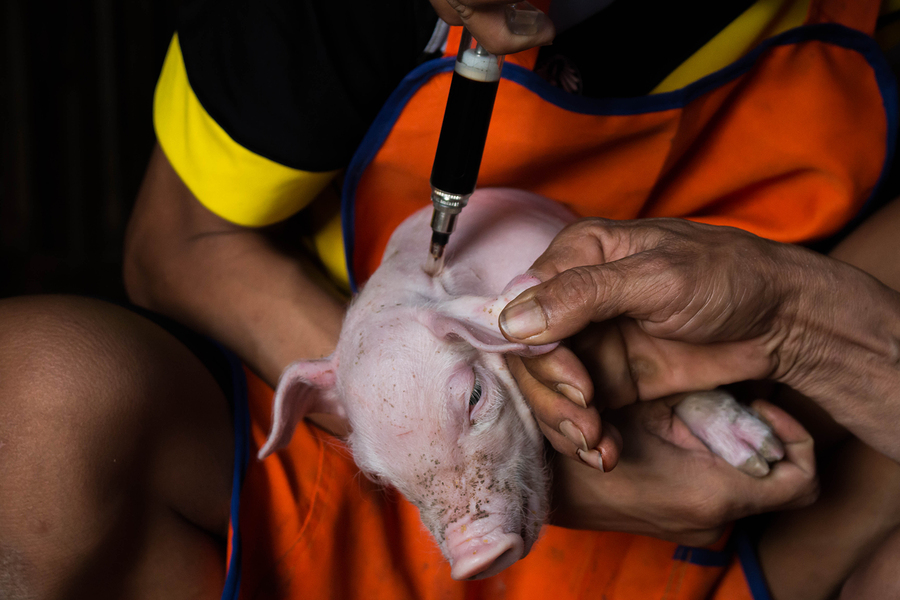Blockchain Technology Set to Revolutionize Food Safety in Supply Chains
By Tomaž Levak, Žiga Drev, and Branimir Rakić
We’ve all heard the term “Blockchain” by now but what exactly is it, and has it advanced to the stage where food businesses can leverage its advantages for food safety purposes? This is an innovation that was first used as an underlying technology for the digital cryptocurrency, Bitcoin. But its potential to enable more trustworthy transactions was quickly recognized by several other industries, particularly those where a safe supply chain is key.
How Does Blockchain Work?
Blockchain’s main innovation is that it keeps all data in a sequence of “blocks” (or “ledger” copies), which are equally dispersed over a network of computer nodes. Because it has no central authority, and because copies of the ledger are stored on every node, it is virtually impossible for anyone to change the data or remove it from the blockchain system. Whatever is put on the blockchain, is set in stone. Hence, we are talking about decentralization of power over the data.
If a food safety scandal emerges, current IT systems have a hard time tracing the problem.
Enterprise Resource Planning Systems Are Limited
This contrasts with Enterprise Resource Planning (ERP) systems
in modern companies, which are centralized and set-up mainly for internal use. This makes them far less useful for cooperation and data exchange. Data in ERP systems is stored in silos, and data exchange between partners mostly works one-step-forward, one-step-back. It is hard to check the quality of historical data, which ultimately leaves the door open for fraud. Furthermore, food supply chains in particular are getting increasingly complex and globalized, which means the existing supply chain process setup is obsolete in the interconnected world of the 21st Century. If a food safety scandal emerges, current IT systems have a hard time tracing the problem. Meanwhile, new online platforms, such as social media, can damage a brand more quickly than ever before.
The Blockchain Opportunity
Blockchain emerges as a solution that can provide immutability and traceability of data, but the technology is still in its early phase, and it does have limitations. Storage of data on the blockchain is expensive, for example, and the number of transactions per second is limited. But that does not stop innovators from building on this promising solution. One of the options set forward to overcome the issue of scalability is to agree on a purpose-built protocol for supply chains. This is a module that can run on top of any ERP data, and can synchronize relevant data along the supply chain, based on mutually agreed standards such as GS1. Consensus checks are performed at all points of the supply chain as a guarantee that the quality of data matches. Data “fingerprints” are permanently stored on a blockchain, guaranteeing the integrity of the whole supply chain.
Blockchain Unleashed
This technical solution can enable further development of various “decentralized applications” based on the synchronized data available, and adaptations can be made to enable applications for more effective supply chain management, better alert systems with faster responsiveness, easier certification and compliance, and much more. The blockchain can be compared to a smartphone, where thousands of applications are available that will build on its features to further enhance its usability. Further solutions may incorporate data from the internet-of-things. For example, data from sensors in the warehousing and transport areas of a business can be synchronized with the network and serve as additional proof that the food was always handled at the right temperature. In the near future, we can expect even more innovation in this direction. Ethereum, which is currently the main blockchain for business applications, enables “smart contracts” which are a set of easily programmable conditions: when they are met, the payment can occur automatically.
Blockchain has the potential to streamline business processes by designing powerful systems that will be trustworthy by their inherent design, so the trust will not be dependent just on the central authority. The technology is already available, so the investment in the application of blockchain at this stage enables companies to stand out in the crowded marketplace while setting the common standards that will shape the supply chains of the future.
About the authors
Tomaž Levak, Žiga Drev, and Branimir Rakić are founders of OriginTrail, a start-up that is building the first purpose-built protocol for supply chains based on blockchain. OriginTrail has been working in food traceability since 2013 and has implemented several existing-use cases of tracing the food from the primary producer (farm) to the point of sale. Further pilot projects for the new blockchain-based solution are planned in China.

-
 FeaturedRisk management
The Cost of a Breach: What a Cyberattack Could Mean for Food Safety Recalls
FeaturedRisk management
The Cost of a Breach: What a Cyberattack Could Mean for Food Safety Recalls
-
 FeaturedRisk management
Securing the Food Chain: How ISO/IEC 27001 Strengthens Cybersecurity
FeaturedRisk management
Securing the Food Chain: How ISO/IEC 27001 Strengthens Cybersecurity
-
 FeaturedRisk management
Revolutionizing Food Safety Training: Breaking Out of the “Check-the-Box” Mentality
FeaturedRisk management
Revolutionizing Food Safety Training: Breaking Out of the “Check-the-Box” Mentality
-
 GFSI Standards
GFSI 2025: Building Trust, Tech-Forward Solutions, and Global Unity in Food Safety
GFSI Standards
GFSI 2025: Building Trust, Tech-Forward Solutions, and Global Unity in Food Safety
-
 FeaturedFood Safety
Integrated Pest Management: Strategies to Protect Your Brand’s Reputation
FeaturedFood Safety
Integrated Pest Management: Strategies to Protect Your Brand’s Reputation
-
 FeaturedFood Safety Culture & Training
No Open Door Policy: Challenges That Impact Pest Control in Food Processing Plants
FeaturedFood Safety Culture & Training
No Open Door Policy: Challenges That Impact Pest Control in Food Processing Plants




